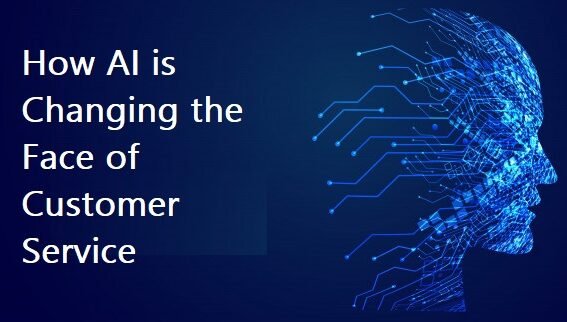Artificial Intelligence (AI) is revolutionizing customer service by offering businesses innovative tools and solutions that enhance efficiency, personalization, and customer satisfaction. This article explores the profound impact of AI on customer service operations, examining key technologies, applications, benefits, challenges, and ethical considerations.
Introduction to AI in Customer Service
Artificial Intelligence in customer service encompasses a range of technologies and applications designed to automate and improve customer interactions. AI-powered solutions leverage machine learning, natural language processing (NLP), and predictive analytics to deliver personalized customer experiences and streamline service delivery processes.
Evolution of Customer Service Technologies
Historically, customer service relied on human agents handling inquiries via phone, email, or in-person interactions. While effective, traditional methods often faced challenges such as long wait times, inconsistent service quality, and limited scalability. AI technologies have transformed customer service by automating routine tasks, analyzing vast amounts of data, and delivering proactive support. Chatbots, virtual assistants, sentiment analysis tools, and predictive analytics are among the innovations reshaping how businesses engage with customers.
Key AI Technologies in Customer Service
AI-powered chatbots simulate human-like conversations to address customer inquiries, provide information, and assist with common tasks in real-time. Natural language understanding (NLU) enables chatbots to interpret and respond to customer queries effectively. Advanced virtual assistants, such as Amazon Alexa and Google Assistant, use AI to perform tasks, answer questions, and execute commands based on voice inputs. These assistants enhance convenience and accessibility for customers across devices. NLP enables machines to understand, interpret, and generate human language, facilitating seamless communication between customers and AI-driven systems. NLP powers chatbots, sentiment analysis tools, and voice recognition systems, improving interaction quality and accuracy.
Applications of AI in Customer Service
AI automates routine inquiries and tasks, such as account inquiries, order tracking, and troubleshooting, through chatbots and self-service portals. Automated customer support reduces response times, enhances efficiency, and enables 24/7 availability. AI integrates customer interactions across multiple channels—including websites, mobile apps, social media, and messaging platforms—ensuring consistent and personalized experiences. Omnichannel AI solutions unify data and communication channels to provide seamless service. AI-powered sentiment analysis tools monitor customer feedback, social media conversations, and reviews to gauge sentiment, identify trends, and measure customer satisfaction. Insights from sentiment analysis inform strategic decisions and improve service quality.
Benefits of AI in Customer Service
AI automates repetitive tasks, accelerates response times, and scales service delivery without compromising quality. Chatbots and AI-driven systems handle high volumes of inquiries simultaneously, reducing wait times and improving operational efficiency. Personalized interactions, proactive support, and omnichannel engagement enhance customer satisfaction and loyalty. AI anticipates customer needs, resolves issues promptly, and delivers seamless experiences across touchpoints, fostering positive relationships. AI reduces operational costs by automating tasks traditionally performed by human agents. Self-service options and AI-driven analytics optimize resource allocation, minimize overhead expenses, and increase productivity in customer service operations.
Challenges and Considerations
Integrating AI technologies with existing IT infrastructure and customer service platforms requires careful planning and technical expertise. Compatibility issues, data synchronization, and system interoperability may pose challenges during implementation. Ensuring AI systems deliver accurate responses and recommendations hinges on robust training data, algorithm refinement, and continuous monitoring. AI errors, misinterpretations, or biases can impact customer trust and satisfaction. AI applications must adhere to ethical guidelines, data privacy regulations, and consumer protection laws. Ensuring transparency, accountability, and responsible AI deployment is crucial for mitigating risks and maintaining regulatory compliance.
Ethical Considerations in AI-Driven Customer Service
Protecting customer data from unauthorized access, breaches, and misuse is paramount. AI systems must comply with data protection regulations, implement encryption standards, and secure sensitive information to safeguard customer privacy. AI algorithms should mitigate biases related to race, gender, age, and socioeconomic status in customer interactions and decision-making processes. Fairness-aware AI design and bias detection techniques promote equitable treatment and minimize discriminatory outcomes. Ensuring AI systems are transparent about their capabilities, limitations, and decision-making processes builds trust with customers. Implementing mechanisms for auditing AI decisions, providing explanations, and handling complaints reinforces accountability and ethical AI practices.
Future Trends in AI-Driven Customer Service
Enhanced NLU capabilities will enable AI systems to understand complex queries, context-specific interactions, and nuances in customer conversations more accurately. Improved language processing technologies will elevate the quality of AI-driven customer interactions. AI will enable hyper-personalized customer experiences by leveraging real-time data, behavioral analytics, and predictive modeling. Advanced personalization algorithms will tailor recommendations, content, and service delivery based on individual preferences and historical interactions. AI-driven autonomous agents will handle increasingly complex customer inquiries, transactions, and service requests autonomously. Autonomous agents equipped with AI capabilities, such as emotional intelligence and problem-solving skills, will elevate service delivery standards.
Case Studies: AI Success Stories in Customer Service
Amazon uses AI algorithms to recommend products based on customer browsing history, purchase behavior, and demographic data. AI-driven customer support features, such as virtual assistants and personalized recommendations, enhance user experience and drive sales. Starbucks leverages AI to streamline mobile ordering, personalize customer recommendations, and manage loyalty programs. AI-driven analytics analyze customer preferences and behaviors to optimize service delivery and enhance customer satisfaction.
Bank of America AI-Powered Virtual Financial Assistants
Bank of America’s virtual financial assistant, Erica, uses AI to provide personalized banking advice, financial insights, and account management support. Erica enhances customer engagement, promotes financial literacy, and facilitates seamless banking experiences. AI integration with IoT devices and wearable technology will enable seamless customer interactions and personalized experiences. AI-driven analytics will harness data from connected devices to anticipate customer needs and deliver proactive support in real-time.
Reshaping Customer Service
Artificial Intelligence is reshaping customer service by introducing innovative technologies, enhancing operational efficiencies, and delivering personalized customer experiences. From AI-powered chatbots and virtual assistants to predictive analytics and hyper-personalization, AI technologies are revolutionizing how businesses interact with customers, address inquiries, and build lasting relationships. However, realizing the full potential of AI in customer service requires addressing challenges related to integration complexity, accuracy, ethical considerations, and regulatory compliance. By prioritizing transparency, fairness, and customer-centricity in AI deployments, businesses can foster trust, enhance satisfaction, and achieve sustainable competitive advantages in the digital era.
Machine Learning for Personalization
Machine learning algorithms analyze customer data to identify patterns, preferences, and behaviors, enabling personalized recommendations, content customization, and targeted marketing strategies. Personalization enhances customer engagement and satisfaction by delivering relevant experiences. Predictive analytics uses historical data and machine learning models to forecast customer behavior, anticipate needs, and preemptively address issues. By predicting trends and preferences, businesses can optimize resource allocation and improve proactive customer service strategies.
Voice Recognition and Virtual Agents
Voice recognition technology enables customers to interact with virtual agents and customer service platforms using voice commands. AI-driven virtual agents assist with inquiries, schedule appointments, and provide real-time support via voice-enabled devices. AI analyzes customer data to gain actionable insights into preferences, purchasing behavior, and engagement patterns. Behavioral analysis informs personalized marketing strategies, product recommendations, and service enhancements tailored to individual customer needs.
Data-Driven Decision Making
AI-powered analytics provide valuable insights into customer behavior, preferences, and trends. Data-driven decisions enable businesses to refine strategies, innovate products, and tailor services to meet evolving customer expectations effectively. Building customer trust in AI technologies requires transparent communication, clear benefits, and user-friendly interfaces. Addressing concerns about data privacy, security, and AI’s impact on jobs is essential for fostering acceptance and adoption among customers.
Customer Acceptance and Trust
AI offers real-time assistance through live chat and co-browsing features. These tools allow AI systems to guide customers through complex processes, troubleshoot issues instantly, and provide step-by-step support, ensuring a smooth and efficient customer experience. AI analyzes customer feedback from various channels, such as surveys, social media, and reviews. This analysis provides valuable insights into customer satisfaction, preferences, and areas for improvement, helping businesses enhance their products, services, and overall customer experience.
Data-Driven Decision Making
AI excels at managing high volumes of customer interactions simultaneously. During peak times or major events, AI systems can handle numerous queries at once, preventing bottlenecks and ensuring that all customers receive timely assistance without overwhelming human agents. AI systems continuously learn and improve from interactions. Machine learning algorithms analyze customer feedback and interaction outcomes to refine responses and processes, ensuring that the quality of customer service improves over time, adapting to changing customer needs and expectations.
As AI continues to evolve, embracing ethical AI principles, leveraging advanced technologies, and adapting to changing customer expectations will be essential for driving innovation and delivering exceptional customer service experiences. By harnessing AI’s transformative capabilities responsibly, businesses can navigate complexities, seize opportunities, and lead in the era of AI-driven customer service excellence.







